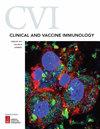Article of Significant Interest Selected from This Issue by the Editors
Q2 Biochemistry, Genetics and Molecular Biology
引用次数: 0
Abstract
Mechanisms of Increased Susceptibility to Salmonella enterica Serovar Typhimurium Bacteremia in the Context of Malaria in African Children Salmonella enterica serovar Typhimurium bacteremia is known to be associated with malaria in African children. To understand the immunological basis of this association, Nyirenda et al. (e00057-17) investigated bactericidal immunity to S. Typhimurium in children with acute and convalescent uncomplicated malaria and in controls. They found that Plasmodium falciparum infection reduced serum bactericidal activity to S. Typhimurium and was associated with reduced complement C3, irrespective of preexisting specific-IgG antibody titers. P. falciparum infection also reduced whole-blood bactericidal activity to S. Typhimurium and was associated with reduction of neutrophil respiratory burst. These findings provide new insights into the increase in susceptibility to S. Typhimurium bacteremia in children from settings of malaria endemicity.由编辑从本期杂志中选出的具有重要意义的文章
非洲儿童疟疾背景下肠炎沙门氏菌血清型鼠伤寒杆菌血症易感性增加的机制众所周知,肠炎沙门氏菌血清型鼠伤寒杆菌血症与非洲儿童疟疾有关。为了了解这种关联的免疫学基础,Nyirenda等人(e00057-17)调查了急性和恢复期无并发症疟疾患儿以及对照组对鼠伤寒沙门氏菌的杀菌免疫。他们发现,恶性疟原虫感染降低了血清对鼠伤寒沙门氏菌的杀菌活性,并且与补体C3的减少有关,与先前存在的特异性igg抗体滴度无关。恶性疟原虫感染也降低了全血对鼠伤寒沙门氏菌的杀菌活性,并与中性粒细胞呼吸爆发的减少有关。这些发现为疟疾流行地区儿童对鼠伤寒沙门氏菌菌血症的易感性增加提供了新的见解。
本文章由计算机程序翻译,如有差异,请以英文原文为准。
求助全文
约1分钟内获得全文
求助全文
来源期刊

Clinical and Vaccine Immunology
医学-传染病学
CiteScore
2.88
自引率
0.00%
发文量
0
审稿时长
1.5 months
期刊介绍:
Cessation. First launched as Clinical and Diagnostic Laboratory Immunology (CDLI) in 1994, CVI published articles that enhanced the understanding of the immune response in health and disease and after vaccination by showcasing discoveries in clinical, laboratory, and vaccine immunology. CVI was committed to advancing all aspects of vaccine research and immunization, including discovery of new vaccine antigens and vaccine design, development and evaluation of vaccines in animal models and in humans, characterization of immune responses and mechanisms of vaccine action, controlled challenge studies to assess vaccine efficacy, study of vaccine vectors, adjuvants, and immunomodulators, immune correlates of protection, and clinical trials.
 求助内容:
求助内容: 应助结果提醒方式:
应助结果提醒方式:


